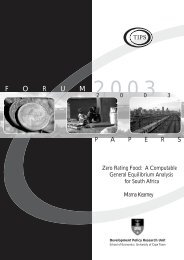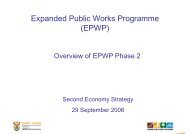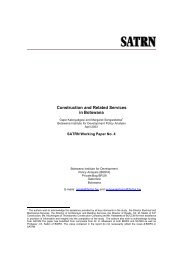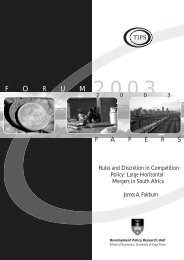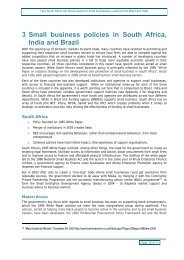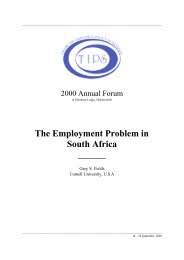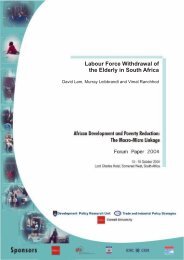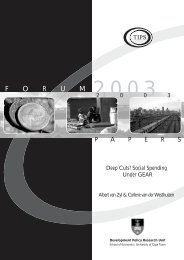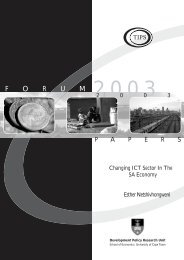Monitor Vol 39 08_Final_Nov08.pdf - tips
Monitor Vol 39 08_Final_Nov08.pdf - tips
Monitor Vol 39 08_Final_Nov08.pdf - tips
You also want an ePaper? Increase the reach of your titles
YUMPU automatically turns print PDFs into web optimized ePapers that Google loves.
Food Policy<br />
94<br />
Trade & Industry <strong>Monitor</strong><br />
A new, more comprehensive global scenario analysis using IFPRI’s International<br />
Model for Policy Analysis of Agricultural Commodities and Trade<br />
(IMPACT) examines current price effects and estimates future ones. In<br />
view of the dynamic world food situation and the rapidly changing biofuels<br />
sector, IFPRI continuously updates and refines its related models, so<br />
the results presented here should be viewed as work in progress. Recently,<br />
the IMPACT model has incorporated 2005/06 developments in supply and<br />
demand, and has generated two future scenarios based on these developments:<br />
• Scenario 1 is based on the actual biofuel investment plans of many<br />
countries that have such plans and assumes biofuel expansions for<br />
identified highpotential countries that have not specified their plans.<br />
• Scenario 2 assumes a more drastic expansion of biofuels to double<br />
the levels used in Scenario 1.<br />
Under the planned biofuel expansion scenario (Scenario 1), international<br />
prices increase by 26 percent for maize and by 18 percent for oilseeds.<br />
Under the more drastic biofuel expansion scenario (Scenario 2), maize<br />
prices rise by 72 percent and oilseeds by 44 percent (Table 5).<br />
Under both scenarios, the increase in crop prices resulting from expanded<br />
biofuel production is also accompanied by a net decrease in the availability<br />
of and access to food, with calorie consumption estimated to decrease<br />
across all regions compared to baseline levels (Figure 11). Food-calorie<br />
consumption decreases the most in Sub-Saharan Africa, where calorie<br />
availability is projected to fall by more than 8 percent if biofuels expand<br />
drastically.<br />
One of the arguments in favor of biofuels is that they could positively affect<br />
net carbon emissions as an alterative to fossil fuels. That added social<br />
benefit might justify some level of subsidy and regulation, since these<br />
external benefits would not be internalized by markets. However, potential<br />
forest conversion for biofuel production and the impact of biofuel production<br />
on soil fertility are environmental concerns that require attention.<br />
As is the case with any form of agricultural production, biofuel feedstock<br />
production can be managed in sustainable or in damaging ways. Clear<br />
environment-related efficiency criteria and sound process standards need<br />
to be established that internalize the positive and negative externalities<br />
of biofuels and ensure that the energy output from biofuel production<br />
is greater than the amount of energy used in the process. In general,<br />
subsidies for biofuels that use agricultural production resources are extremely<br />
antipoor because they implicitly act as a tax on basic food, which<br />
represents a large share of poor people’s consumption expenditures and<br />
becomes even more costly as prices increase, as shown above (von Braun<br />
2007).<br />
Figure 10: Meat and dairy prices (January 2000 = 100)<br />
300<br />
250<br />
January 2000 = 100<br />
200<br />
150<br />
100<br />
50<br />
Jan-00<br />
Jul-00<br />
Jan-01<br />
Jul-01<br />
Jan-02<br />
Jul-02<br />
Jan-03<br />
Jul-03<br />
Jan-04<br />
Jul-04<br />
Jan-05<br />
Jul-05<br />
Jan-06<br />
Jul-06<br />
Jan-07<br />
Jul-07<br />
Beef Butter Poultry Milk<br />
Notes: Beef = USA beef export unit value; poultry = export unit value of broiler cuts; butter = Oceania indicative export prices, f.o.b. Milk =<br />
Oceania whole milk powder indicative export prices, f.o.b.<br />
Source: Data from FAO 2007c.



